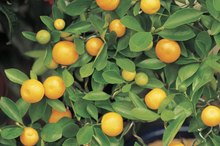How to Ripen Oranges in the Microwave
An orange is a delightful addition to many recipes, such as sorbets, fruit salsas and salads. Oranges are picked at peak ripeness and do not continue to ripen after they are picked; however, exposure to ethylene can prompt ripening of the peel. Microwaving your orange, particularly in the presence of high-ethylene fruits like bananas and apples, can promote ripening of the outer peel.
Fruit Ripening
Fruit ripens through developmental and biological processes. This chemical synthesizing process produces the plant hormone ethylene, making fruit softer and sweeter. The impact of ethylene on fruit ripeness was discovered in 1901 by the Russian scientist Dimitry Neljubow. We now know that heat prompts plants to produce more ethylene, which can hasten the ripening of the fruit 3.
- Fruit ripens through developmental and biological processes.
- We now know that heat prompts plants to produce more ethylene, which can hasten the ripening of the fruit 3.
Oranges
How to Eat Cherimoya
Learn More
Determining whether an orange is ripe can be a challenge for those who aren't aware of what to look out for. The skin should be golden, with thin skin that is finely lined. The orange is one of the few fruits that does not ripen after it is picked, sometimes having a yellowish-golden peel. Producers might add ethylene to the peel to give it the orange, ripe look you find in the store.
- Determining whether an orange is ripe can be a challenge for those who aren't aware of what to look out for.
- The orange is one of the few fruits that does not ripen after it is picked, sometimes having a yellowish-golden peel.
Microwaving
To enhance the ripe appearance of an orange using the microwave, place the orange on a microwaveable dish. Place it inside the microwave and set the timer to 15 seconds on medium-high. You also can try adding a fruit, such as a banana or apple, into the microwave as well. These two fruits produce significant amount of ethylene. According to ChemMatters, the exposure to ethylene ripens the peels of citrus fruit but does not increase the sweetness.
- To enhance the ripe appearance of an orange using the microwave, place the orange on a microwaveable dish.
Other Methods
How to Ripen Cherries
Learn More
If you do not need the orange ripened immediately and would like to use more natural methods of ripening, you can place the orange inside a paper bag along with an apple. Apples are well-known to emit ethylene gases as they ripen. Close the bag by folding over the top, then place the bag in a window where sunlight can warm the orange, checking the package daily to ensure you catch it before it is overripe.
- If you do not need the orange ripened immediately and would like to use more natural methods of ripening, you can place the orange inside a paper bag along with an apple.
- Close the bag by folding over the top, then place the bag in a window where sunlight can warm the orange, checking the package daily to ensure you catch it before it is overripe.









